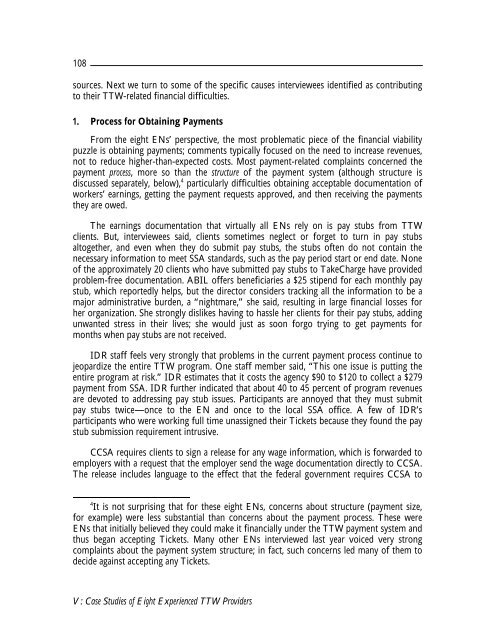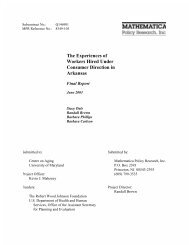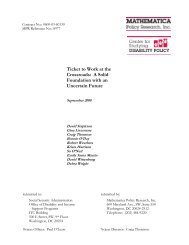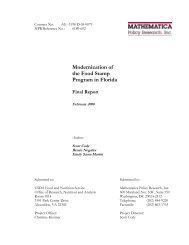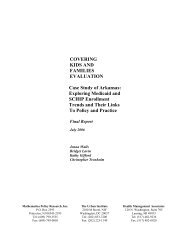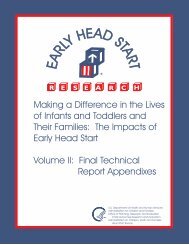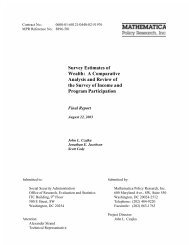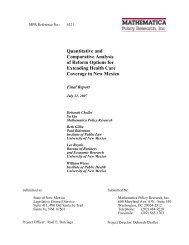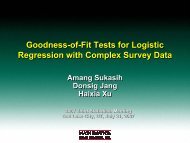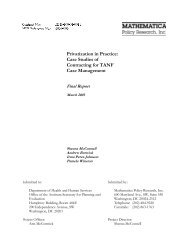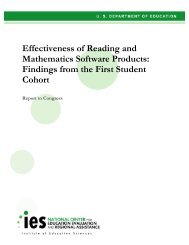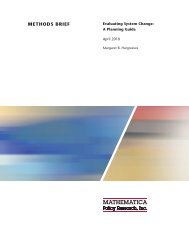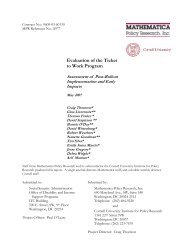Evaluation of the Ticket to Work Program Initial Evaluation Report
Evaluation of the Ticket to Work Program Initial Evaluation Report
Evaluation of the Ticket to Work Program Initial Evaluation Report
Create successful ePaper yourself
Turn your PDF publications into a flip-book with our unique Google optimized e-Paper software.
108<br />
sources. Next we turn <strong>to</strong> some <strong>of</strong> <strong>the</strong> specific causes interviewees identified as contributing<br />
<strong>to</strong> <strong>the</strong>ir TTW-related financial difficulties.<br />
1. Process for Obtaining Payments<br />
From <strong>the</strong> eight ENs’ perspective, <strong>the</strong> most problematic piece <strong>of</strong> <strong>the</strong> financial viability<br />
puzzle is obtaining payments; comments typically focused on <strong>the</strong> need <strong>to</strong> increase revenues,<br />
not <strong>to</strong> reduce higher-than-expected costs. Most payment-related complaints concerned <strong>the</strong><br />
payment process, more so than <strong>the</strong> structure <strong>of</strong> <strong>the</strong> payment system (although structure is<br />
discussed separately, below), 4 particularly difficulties obtaining acceptable documentation <strong>of</strong><br />
workers’ earnings, getting <strong>the</strong> payment requests approved, and <strong>the</strong>n receiving <strong>the</strong> payments<br />
<strong>the</strong>y are owed.<br />
The earnings documentation that virtually all ENs rely on is pay stubs from TTW<br />
clients. But, interviewees said, clients sometimes neglect or forget <strong>to</strong> turn in pay stubs<br />
al<strong>to</strong>ge<strong>the</strong>r, and even when <strong>the</strong>y do submit pay stubs, <strong>the</strong> stubs <strong>of</strong>ten do not contain <strong>the</strong><br />
necessary information <strong>to</strong> meet SSA standards, such as <strong>the</strong> pay period start or end date. None<br />
<strong>of</strong> <strong>the</strong> approximately 20 clients who have submitted pay stubs <strong>to</strong> TakeCharge have provided<br />
problem-free documentation. ABIL <strong>of</strong>fers beneficiaries a $25 stipend for each monthly pay<br />
stub, which reportedly helps, but <strong>the</strong> direc<strong>to</strong>r considers tracking all <strong>the</strong> information <strong>to</strong> be a<br />
major administrative burden, a “nightmare,” she said, resulting in large financial losses for<br />
her organization. She strongly dislikes having <strong>to</strong> hassle her clients for <strong>the</strong>ir pay stubs, adding<br />
unwanted stress in <strong>the</strong>ir lives; she would just as soon forgo trying <strong>to</strong> get payments for<br />
months when pay stubs are not received.<br />
IDR staff feels very strongly that problems in <strong>the</strong> current payment process continue <strong>to</strong><br />
jeopardize <strong>the</strong> entire TTW program. One staff member said, “This one issue is putting <strong>the</strong><br />
entire program at risk.” IDR estimates that it costs <strong>the</strong> agency $90 <strong>to</strong> $120 <strong>to</strong> collect a $279<br />
payment from SSA. IDR fur<strong>the</strong>r indicated that about 40 <strong>to</strong> 45 percent <strong>of</strong> program revenues<br />
are devoted <strong>to</strong> addressing pay stub issues. Participants are annoyed that <strong>the</strong>y must submit<br />
pay stubs twice—once <strong>to</strong> <strong>the</strong> EN and once <strong>to</strong> <strong>the</strong> local SSA <strong>of</strong>fice. A few <strong>of</strong> IDR’s<br />
participants who were working full time unassigned <strong>the</strong>ir <strong>Ticket</strong>s because <strong>the</strong>y found <strong>the</strong> pay<br />
stub submission requirement intrusive.<br />
CCSA requires clients <strong>to</strong> sign a release for any wage information, which is forwarded <strong>to</strong><br />
employers with a request that <strong>the</strong> employer send <strong>the</strong> wage documentation directly <strong>to</strong> CCSA.<br />
The release includes language <strong>to</strong> <strong>the</strong> effect that <strong>the</strong> federal government requires CCSA <strong>to</strong><br />
4 It is not surprising that for <strong>the</strong>se eight ENs, concerns about structure (payment size,<br />
for example) were less substantial than concerns about <strong>the</strong> payment process. These were<br />
ENs that initially believed <strong>the</strong>y could make it financially under <strong>the</strong> TTW payment system and<br />
thus began accepting <strong>Ticket</strong>s. Many o<strong>the</strong>r ENs interviewed last year voiced very strong<br />
complaints about <strong>the</strong> payment system structure; in fact, such concerns led many <strong>of</strong> <strong>the</strong>m <strong>to</strong><br />
decide against accepting any <strong>Ticket</strong>s.<br />
V: Case Studies <strong>of</strong> Eight Experienced TTW Providers


